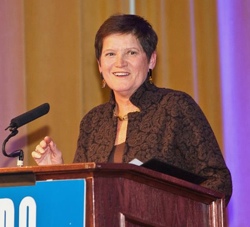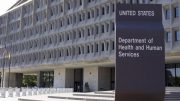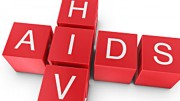
Rick Larkin, left, Sylvia Brewer, and Melvin Simms performed a spoken word piece by Theater Offensive about what it was like to be a long-term survivor of HIV/AIDS. Photo: Marilyn Humphries
BOSTON, Massachusetts — Approximately 200 people attended AIDS Action Committee’s 2012 Annual Meeting held Nov. 8 at the Benjamin Franklin Institute of Technology in Boston’s South End. The event featured a performance by three longtime HIV survivors that was written and produced by Theater Offensive.
The Annual Meeting began with AIDS Action Board Chair Tom Webber recounting the work of AIDS Action throughout 2012:
- providing daily meals and access to basic health services to more than 700 homeless and street-involved youth;
- distributing more than 175,000 clean syringes;
- connecting more than 100 transgender women with culturally competent health care providers;
- testing more than 800 gay and bisexual men at risk for HIV;
- and helping nearly 1,200 households avoid becoming homeless.
This work by AIDS Action and other AIDS service organizations in the state, Webber said, has contributed to
Massachusetts’ having reduced new diagnoses of HIV by 54 percent since 1999, which has meant that nearly 6,000 people who might otherwise have become HIV positive have remained negative. And it also means that the Commonwealth of Massachusetts will save more than $2 billion in HIV-related health care costs.
AIDS Action honored longtime AIDS activist Kim R. McCant; the late Joe McKee of AIDS Worcester Project; AIDS fundraiser Janet Santa Anna; and the HIV awareness efforts of The Greater Boston Business Council with its annual Committment to Action award.
AIDS Action President & CEO Rebecca Haag concluded the evening with a call to muster the political will needed to finally end the epidemic. “The future of AIDS has never looked brighter,” Haag said. “That’s because the end of AIDS is within our grasp. While we will continue to see people living with HIV for decades to come, we can end the transmission of new infections of HIV. Right now in Massachusetts we see less than 650 new HIV diagnoses annually.”
In this past year, Haag added, one-quarter of the state’s HIV/AIDS prevention budget has been cut as a result of federal reductions in HIV spending to states like Massachusetts where HIV diagnoses have been steadily declining. And state HIV/AIDS funding has been on a consistent downward trajectory over the last decade from just under $52 million in 2000 to just over $32 million today.
Haag called on others to join AIDS Action in keeping the pressure on those who have the power to impact the epidemic, and to increase advocacy efforts to ensure that policy makers, funders, and the public are educated about efficient and effective ways to fight the HIV/AIDS epidemic.
[Courtesy of AIDS Action]








